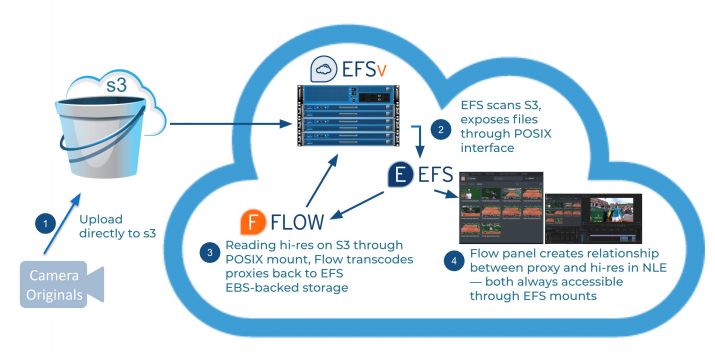EditShare’s Griffin discusses how EFSv can change the economics of cloud editing
EditShare has this week introduced EFSv which the company believes will make cloud editing more accessible by optimising the use of both object and block storage to allow for claimed savings of up to 75% compared to existing costs of cloud storage and workstations.
EFSv is designed to solve work arounds associated with proxy editing and conforming for all editors including Adobe, Avid, Blackmagic Design and Grass Valley. Costs saving through better cloud storage management allows facilities to keep production content and archives online and available at all times.
With EFSv, high-resolution original files can be stored in economical object storage, yet read through the EFSv native file system driver while small lightweight editing proxies are stored in standard block storage. Both sets of files are always available and accessible to the NLE application — streamlining colour grading, effect creation and conforming.
The intelligent movement between storage tiers can save clients money over an entire production. High-performance block storage tiers, used for high-resolution editing, are expensive. If users can minimise their use of block storage by only storing editing proxy files there, while maintaining the high-resolution files on object storage, savings can be achieved.
Additionally, for Adobe Premiere Pro, the new FLOW panel automates the clip import process to ensure Premiere Pro understands that both versions exist, and enables the ability to toggle back and forth between them at any time.

Lee Griffin, EditShare, director of product marketing
On a Zoom call EditShare director of product marketing Lee Griffin told SVG Europe, “What do I do with all my archives at the end of my production? How do I access them? Do I put them on long-term tape? Block storage is expensive but very fast, perfect for edting 4K and HD files. Object storage is cheap, but it’s not compatible with editing – as it was designed for mass data archive. We’ve looked at block storage and object storage and we said ‘why don’t we put proxies of all the content that’s in your object storage into block storage?’ By doing that, 20,000 hours of proxy version could be 10-12 terabytes of storage. And you could keep that on your high speed block storage. We have integrated our EFS drivers and reverse-engineered them to look at both object and block,” said Griffin.
“When you’ve got an editing timeline, you pull your proxy version into the timeline. And when you want to replace it with the high-res, you hit the toggle button and it automatically points it to the cheap object storage – and immediately replaces the proxy version with the high resolution.
“So immediately you could be talking about between 50 and 75% of saving, working in the cloud. There’s no deep archiving to find clips and pull them from LTOs. You can immediately cut the programme and just hit the toggle button and it will replace it with the high-end content. This is a feature that doesn’t exist in the industry today.
“You’re not moving files on and off: the system is pointing at two files simultaneously and with the flick of a button it automatically switches to where it is located. You could have your entire archive on cloud, but it is instantly available because all your proxies are kept in object storage.
“We believe this will open up a lot of market segments, particularly in sports: people who want instant access to their archive and their productions. No LTO-5, 6, 7, 8, and no retrieving overnight to find the right content,” he said.
“EFSv is about spinning up, scaling up and then scaling down and putting it in pause mode: you’re not  paying for it while it’s sitting there. The great thing about the platform is that it integrates with all the edit suites. But what’s great as well for EFSv, particulartly in the sports market, is that it has opened the API infrastructure to everybody. We’ve made it public, so now a sports company like Thewz Sports can tie onto the back of the API and we can then pull all the metadata from Thewz about what’s going on in games, plays, team members – all of that data.
paying for it while it’s sitting there. The great thing about the platform is that it integrates with all the edit suites. But what’s great as well for EFSv, particulartly in the sports market, is that it has opened the API infrastructure to everybody. We’ve made it public, so now a sports company like Thewz Sports can tie onto the back of the API and we can then pull all the metadata from Thewz about what’s going on in games, plays, team members – all of that data.
“Another company that has jumped onto the API is Sportscast, who are providing the integration to Daktronic and Barco video walls in entertainment stadium designs. So for example if they wanted to pull video and overlay their scoreboard technology they can pull data from EFSv. It enables anyone to work from anywhere,” said Griffin.

